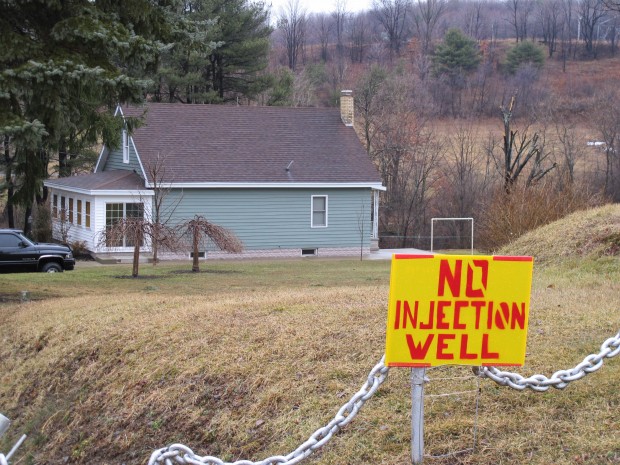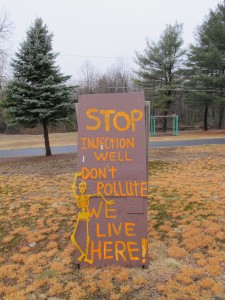No Rest for Retirees: Fractivism Becomes a Full-Time Job
-
Susan Phillips

Susan Phillips / StateImpact Pennsylvania
Marianne and Rick Atkinson with their dog Spot, on their property in Clearfield County.
Imagine what you’d like to do when you retire. Spend more time with the grand kids, travel, garden, relax? A lot of retirees living in natural gas drilling areas of the state have these same dreams. But they’re now finding themselves fighting the gas industry.
Rick and Marianne Atkinson live on 100 acres in Brady Township, Clearfield County. Driving to their home down a wooded, winding road, a small village appears with the houses sitting fairly close to one another. The first thing you notice are the signs – bright yellow with red lettering that read “No Injection Well.” One even has a Halloween skeleton attached to it.
Pointing to her neighbor’s land from her backyard, Marianne shows me the spot of a potential natural gas waste water disposal well. About a year ago, Marianne was walking her dog Spot and discovered fresh surveyor’s tape on that neighbor’s land.
“And so I stopped by his house and knocked on his door,” says Marianne. “And I said I see your land’s being surveyed, what’s going on? Oh, he says, someone from Falls Creek is going to put a well in. So I said is it a Marcellus well? Oh I don’t know, he said, some kind of well. So that was the end of that.”
That was in June of 2011. Then three months later, a car pulled up to the house and Rick was home.
“I’m minding my own business at home,” says Rick. “And this car comes, couple guys get out. [They say] we’re here to test your water because they’re going to drill a disposal well on the other side of the hill. And right away he says, if your water gets contaminated the Brady Township water supply is right down there on the other side of the tracks.”
Clearfield County was once coal country, where strip mining led to polluted water supplies. So, a good portion of the Township relies on treated municipal water systems. But the Atkinsons and their neighbors have really good well water. And they don’t want to lose it.
So Marianne got to work. She filed Right to Know requests with the Department of Environmental Protection and the EPA. They got rejected. She filed again. She spoke to local officials, who at the time had no idea of the plan. She started researching deep injection wells, finding a report about the feasibility of these wells in Pennsylvania dating back to 1972. She’s become somewhat of an expert on deep injection wells and the state’s geology.
“It was like, oh I have to learn stuff really fast,” says Marianne. “It’s like being back in school again.”

Susan Phillips / StateImpact Pennsylvania
A sign protesting a proposed deep injection well sits on the lawn of a home in Brady Township, Clearfield County.
Marianne is afraid her well water could be ruined if a company starts trucking in millions of gallons of frack water from Marcellus Shale natural gas drilling sites all over the state. The waste water would get pumped at high pressure deep underground from a site on her neighbor’s land, just 900 feet from her own water well. She’s organized a post card campaign for her neighbors to inform their elected officials and the EPA that they want notice when and if the permit for the deep injection well is completed.
She started checking the EPA’s public notices every day. And one day last December, she didn’t like what she saw.
“My eyes popped open,” says Marianne. “I read: Clearfield County, injection well failure.”
A deep injection well operated by another company, Exco Resources, had leaked, but the company continued to operate the well without informing the EPA. Federal regulators have since halted injections at the site and fined the company. The well failed a mechanical integrity test and the EPA has yet to allow the facility to resume operation. But the incident made the Atkinsons and their neighbors even more worried.
“In the beginning I felt some degree of safety,” says Rick. “Because in the permit it says if there was a failure of mechanical integrity, they would notify the EPA within 24 hours. So it was very disturbing to me that a basic fundamental operational failure occured and they didn’t notify the EPA. And not only that, they kept injecting.”

Susan Phillips / StateImpact Pennsylvania
A stick marks the place where a deep injection well is proposed for Brady Township, Clearfield County.
Rick Atkinson is retired from warehouse work, and says he wanted to be a “hobby farmer.” Marianne Atkinson retired three years ago, after delivering mail for 32 years.
She says she hoped to spend her newfound freedom playing the church organ, and gardening, but instead the Atkinsons devote their time to learning about natural gas disposal wells.
“It has taken over our lives. I’m supposed to be retired now,” says Marianne.  “And this is like my full-time job that I’m not getting paid for.”
Worried about losing their water supply, and watching their property values plummet, the Atkinsons have become part of a growing, decentralized grassroots movement, working from their kitchen tables, to put the brakes on natural gas development. Some have organized into official nonprofit organizations. Josh McNeil is an organizer with the Conservation Voters of Pennsylvania, a decades-old environmental lobbying group. McNeil has tracked about 50 separate local groups devoted to fighting some aspect of gas drilling.
“The biggest impact is that people in this state have neighbors,” says McNeil. “They’re knocking on doors. They’re not relying on big organizations. They’re not relying even on the media. It’s person-to-person organizing.”Â

Susan Phillips / StateImpact Pennsylvania
A sign opposing a planned deep injection well sits on a lawn in Brady Township, Clearfield County
Helped along of course, by the internet.
But for now, the Atkinsons and their neighbors are in limbo. So far, no permit application has been completed for the disposal well. Marianne Atkinson says in the meantime, she tries not to lie awake at night worrying.
Marianne and Rick have paid off their mortgage. And it turns out it wouldn’t be so easy to hook up to the Township’s treated water supply. So if something happens to their water, they would lose everything if they walked away.
“My concept of this is it’s a battle of wealth against wealth,” says Rick. “People who want this injection well they’re trying to accumulate wealth. We have wealth on the other side of the hill and we’re trying to protect our wealth.”
The EPA is now considering applications for four new injection wells in Pennsylvania.
















